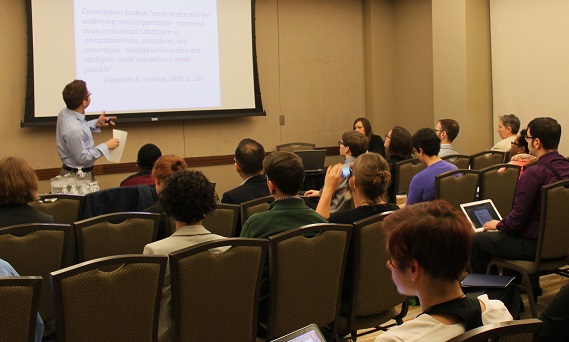Education faculty lead prestigious AERA institute examining equity in mathematics education
by The College of Education / Jun 17, 2013

Sarah Lubienski, professor of Curriculum and Instruction, and Joseph Robinson, assistant professor of Educational Psychology, taught the AERA Institute on Statistical Analysis for Education Policy May 20-23 in Washington, D.C., where Lubienski again served as director and Robinson 
 repeated his role as faculty of the institute. This was their second year leading the institute, which addressed intersections of mathematics education and equity. According to Lubienski, the event provides a rare opportunity for scholars from mathematics education, statistics, and other fields to come together and learn about cutting-edge data sets and research methods.
repeated his role as faculty of the institute. This was their second year leading the institute, which addressed intersections of mathematics education and equity. According to Lubienski, the event provides a rare opportunity for scholars from mathematics education, statistics, and other fields to come together and learn about cutting-edge data sets and research methods.
Policy-relevant topics were addressed, including such issues as students’ opportunities to learn specific mathematical content; access to high-quality mathematics teachers; students’ course-taking and career plans; and students’ mathematics achievement, beliefs, and attitudes. Patterns related to social class, race/ethnicity, language, gender, and disability were also considered during the three-day institute. The institute's goal is to build the capacity of the U.S. education research community to use large-scale national and international data sets such as those from the NCES, NSF, and other federal agencies for basic, policy, and applied research.
Lubienski, who is a member of the AERA Grants Governing Board, led discussions on the overall topic while Robinson led discussions on methods used to analyze large-scale data sets. Colleen Ganley and Casey George-Jackson, two IES fellows from Illinois’ Postdoctoral Program in Mathematics Education, served as instructional assistants again this year. During the institute, leaders guided the 25 participants as they designed their own analyses. (See AERA page for the complete list of institute personnel.) Each year, a select group of scholars are selected to participate in the statistical institute via a competitive application process.
“It is not surprising that AERA has called upon our renowned faculty to lead and teach the next generation of math-equity researchers,” said Fouad Abd-El-Khalick, professor and department head of Curriculum and Instruction. ”Sarah Lubienski's direction of the AERA Institute is a reflection of her national prominence as a researcher of mathematics education, equity, and large-scale, policy-relevant research. Joe Robinson’s leadership attests to his deep expertise in quasi-experimental research methods, which are increasingly important as large-scale datasets are becoming more available to education researchers.” Abd-El-Khalick added that postdoctoral fellows Colleen Ganley and Casey George-Jackson “have received outstanding training from Sarah and Joe and are therefore able to play a lead role in teaching others how to analyze mathematics education data.”
Both Lubienski and Robinson's research focuses on gender equity in math education, among other areas.